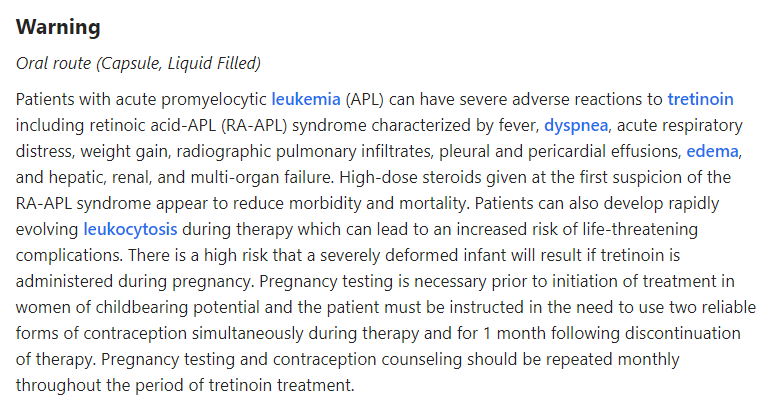CopeAndRope
Maxillophiliac
- Joined
- Aug 17, 2019
- Posts
- 2,986
- Reputation
- 4,719
[UPDATE] I linked isotretinoin studies instead of Tretinoin, but that doesn't change that Tretinoin is a Vitamin A derivate and high doses of vitamin A can bring mental depression as a side effect: https://www.jwatch.org/jd199603010000004/1996/03/01/topical-tretinoin-and-neurologic-side-effects
[/UPDATE]
__________________________________________________________-
I have been feeling weird lately, lethargic, depressed and more unmotivated than ever. My doubts were confirmed to be true. I will not discontinue the usage of Tretinoin, but I will reduce it to 1 application per day, if the side effects don't leave, I will decrease it to 1 application every 2 days or more, until the sides disappear.
@PrettyBoyMaxxing I'm tagging you because I know you're using it as well.
Source:
The authors speculate that tretinoin was the cause of the neurotoxicity, since vitamin A and synthetic retinoids can cause headache, pseudotumor cerebri, irritability, ataxia, fatigue, depression, and psychosis.
[/UPDATE]
__________________________________________________________-
I have been feeling weird lately, lethargic, depressed and more unmotivated than ever. My doubts were confirmed to be true. I will not discontinue the usage of Tretinoin, but I will reduce it to 1 application per day, if the side effects don't leave, I will decrease it to 1 application every 2 days or more, until the sides disappear.
@PrettyBoyMaxxing I'm tagging you because I know you're using it as well.
3.2 Suicide and Depression in Acne Patients Treated with Isotretinoin
3.2.1 Individual accounts of depression following isotretinoin treatment
One patient was an 18 year-old man who developed depressed mood, loss of interest, apathy, insomnia, anergia, anhedonia, and irritability, with feelings of guilt and loss of work and social function after two months of isotretinoin treatment. This patient attempted suicide on the fifth month of isotretinoin treatment. At the time of psychiatric evaluation his HAM-D score was 31, representing clinically significant depression. He had been receiving trazodone for the prior six weeks without benefit, and was still on isotretinoin at the time of the suicide attempt. After discontinuation of isotretinoin and administration of fluoxetine, there was an improvement in mood over 4 weeks with a Ham D score of five at follow up.
A second patient was a 20 year old women treated with isotretinoin who developed depression, tearfulness, suicidal ideation, feelings of worthlessness and agitation, anergia and anhedonia, irritability and anger. Her HAM-D score was 29. The patient also had symptoms of headache. Following supposed discontinuation of isotretinoin and treatment with imipramine and several other antidepressants there was a poor response. She later revealed that she had been surreptitiously continuing(lol) the isotretinoin, but after she finally stopped, and fluoxetine was started, she had a reduction of symptoms within two weeks and a follow-up HAM-D score of 8.
A third patient was reported to have several months of symptoms of depressed mood, irritability, aggression, agitation, decreased sleep, decreased appetite, reduced concentration, anhedonia, and early morning awakening that began during a course of isotretinoin therapy. These symptoms resulted in the breakup of her marriage. At the time of the evaluation she continued to have depressive symptoms even though she had been off isotretinoin for 10 months. Her Hamilton Rating Scale for Depression (HAM-D) score was 26, consistent with clinically significant depression, and fell to 9 five weeks after administration of an antidepressant, indicating successful treatment of depression. The authors described three other cases that resolved with discontinuation of isotretinoin
Source:
Last edited:



